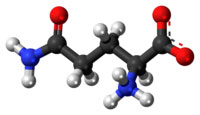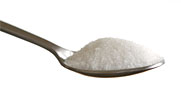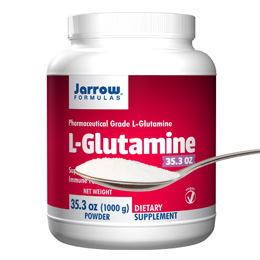- Like
- SHARE
- Digg
- Del
- Tumblr
- VKontakte
- Flattr
- Buffer
- Love This
- Save
- Odnoklassniki
- Meneame
- Blogger
- Amazon
- Yahoo Mail
- Gmail
- AOL
- Newsvine
- HackerNews
- Evernote
- MySpace
- Mail.ru
- Viadeo
- Line
- Comments
- Yummly
- SMS
- Viber
- Telegram
- JOIN
- Skype
- Facebook Messenger
- Kakao
- LiveJournal
- Yammer
- Edgar
- Fintel
- Mix
- Instapaper
- Copy Link
 Glutamine: Worth the Hype, or Just More Supplement Snake Oil?
Glutamine: Worth the Hype, or Just More Supplement Snake Oil?
Alongside protein and creatine, glutamine is generally cited as one of the top three supplements to take for optimal health and fitness.
Glutamine is often called “L-Glutamine” and either name you’ll see is referring to the same compound.
Many glutamine benefits are touted such as faster recovery from exercise, enhanced lean muscle mass, immune system support, and quicker wound healing.
Glutamine is also widely considered to safe when taken as recommended. Sounds great, right? Of course! Some athletes and bodybuilders consider glutamine supplements an essential component of their arsenal, while others claim it doesn’t live up to the hype.
You have probably realized that supplement marketers throw around lofty claims while offering little or no real benefits even when taken as directed.
My approach to supplementation is to be smart and keep it simple. Only take supplements that are backed by strong support it in terms of both safety AND effectiveness.
Supplements are expensive and add extra hassle to your day, so you should be focusing on only the best to optimize both your money and time.
So where does glutamine rank among supplement choices? Keep reading to find out what glutamine can do for you (and what it can’t). We’ll go over what glutamine is made of and how it works, the benefits of glutamine supplementation, glutamine do’s and don’ts, as well as glutamine dosing guidelines.
What is Glutamine, and How Does it Work?
 Let me begin by offering a quick and dirty overview of what glutamine is and what it does in the body. Glutamine is an amino acid, and is actually the most abundant of the free amino acids circulating in the human body.
Let me begin by offering a quick and dirty overview of what glutamine is and what it does in the body. Glutamine is an amino acid, and is actually the most abundant of the free amino acids circulating in the human body.
This amino acid can be found both circulating freely in the bloodstream and in storage in muscle tissue. Additionally, glutamine is one of the few amino acids that can cross the blood-brain barrier.
Glutamine has many interesting functions throughout the body, but those of most interest to fitness folks are probably glutamine’s key roles in protein synthesis (think muscle-building), waste product dumping (especially ammonia), and support for hardworking immune cells.
Glutamine is made mostly in the muscle tissue but is also produced by the lungs. The most glutamine-hungry cells in the body are actually the cells that line the intestinal wall, followed by muscle tissue.
Glutamine is considered nonessential, which means that the body will normally produce enough glutamine on its own without requiring supplementation.
In times of injury, illness, or high stress, glutamine becomes conditionally essential, meaning that dietary sources or supplementation is indicated.
Typical dietary intake of glutamine ranges from 1-6g per day. Glutamine-rich foods include your general protein-rich foods such as meat, dairy, and legumes. Small amounts are found in other plant sources.
What Are the Benefits of Glutamine Supplementation?
 Glutamine supplementation is not for everyone. Natural glutamine levels are more than sufficient to carry out all its functions in the average person.
Glutamine supplementation is not for everyone. Natural glutamine levels are more than sufficient to carry out all its functions in the average person.
However, hard-training fitness folks and athletes, especially runners, can have depleted glutamine levels from the stress of hard, long-duration exercise.
Also, people fighting illness, recovering from physical trauma, or under a great deal of stress may have a depleted level of glutamine.
If you fall into either of these categories, the top four benefits of glutamine supplementation include the following:
- Muscle tissue support: Glutamine is utilized during protein synthesis. When glutamine levels are depleted from hard exercise, protein synthesis is less efficient. Adding supplemental glutamine may help get you back up to normal. Additionally, glutamine is used in energy production, so low levels can have a negative effect on your performance.
- Immune system support: If you’re a runner or endurance athlete, you will definitely know that it’s very common to get a cold after an event. This is thought to be related to lowered glutamine levels from training and competing long and hard. Clinical research has indicated that glutamine supplementation helps prevent runners from getting these nasty post-event colds.
- Encouraging rehydration and electrolyte balance: Alongside an adequate fluid intake, glutamine may help with the uptake of water and electrolytes after hard exercise, which contributes to adequate blood volume and electrolyte balance, which add up to enhanced exercise recovery.
- Wound healing: You might be surprised to learn that glutamine is better-studied for wound healing than for fitness applications. Clinical studies have indicated that glutamine helps wound healing and is beneficial after surgery or after sustaining serious burns. Glutamine is massively utilized by the gut for cell repair. Additionally, cancer patients often have a low glutamine level, which has piqued research interest on whether supplemental glutamine should be included in cancer treatment protocols. Support is still coming in and further studies are needed to say anything with certainty.
Never use a supplement in place of medical care. If you have a medical condition, talk to your doctor to see if glutamine is safe for you.
Who Can Benefit From Glutamine Supplementation?
 Current research indicates that glutamine supplementation is generally harmless for healthy people as long as the supplement taken as directed. However, supplemental glutamine will only benefit people engaging in heavy duty, long-term exercise. In other words, if you are a casual exerciser like most gym-goers, supplemental glutamine is not going to do much of anything for you. Your body is already making enough glutamine on its own.
Current research indicates that glutamine supplementation is generally harmless for healthy people as long as the supplement taken as directed. However, supplemental glutamine will only benefit people engaging in heavy duty, long-term exercise. In other words, if you are a casual exerciser like most gym-goers, supplemental glutamine is not going to do much of anything for you. Your body is already making enough glutamine on its own.
However, if you are training hard or competing as an athlete, glutamine may indeed help you recover faster and help prevent infections caused by a weakened immune system from the stress of regular hard exercise.
When Should I Take Glutamine?
 To encourage absorption and avoid gastrointenstinal discomfort, it’s recommended that you spread your glutamine doses throughout the day. Take glutamine away from food to encourage its uptake into your cells.
To encourage absorption and avoid gastrointenstinal discomfort, it’s recommended that you spread your glutamine doses throughout the day. Take glutamine away from food to encourage its uptake into your cells.
Taking glutamine before and during your workout may assist in uptake of water and electrolytes as well as spare your muscle from being used as fuel. A popular approach to glutamine dosing is to take it in the morning, during or after your workout, and before you go to bed.
At this time, clinical studies do not back any specific dosing schedule for athletes taking glutamine. And although bodybuilders may rave about glutamine as an ergogenic aid (i.e., it produces energy in the body), evidence for this remains anecdotal.
Don’t mix glutamine powder into hot liquids as this destroys its amino acid structure and renders it inactive. Also, avoid any premade liquid preparations of glutamine. Due to its instability, it will break down over time if kept suspended in liquid. Look for powders and capsules instead, and always mix it with either cold or room temperature water.
How Much Glutamine Should I Take?
 Common glutamine dosing recommendations state that adults should take 500-1000mg one to three times daily to experience benefits. Up to 14g (that’s 14,000 mg) in divided doses is thought to be safe, but you should only take this much under the supervision of a health care professional.
Common glutamine dosing recommendations state that adults should take 500-1000mg one to three times daily to experience benefits. Up to 14g (that’s 14,000 mg) in divided doses is thought to be safe, but you should only take this much under the supervision of a health care professional.
Also note that other combination supplements such as pre-workouts and post-workouts often contain glutamine, so factor those amounts into your daily dose to avoid excessive doses!
Are There Any Risks or Side Effects Associated With Glutamine?
Among healthy people, glutamine has a low incidence of side effects and is generally considered safe as long as you take it as directed.
Those with health concerns should absolutely speak with their doctor before taking glutamine supplements. If you are taking other medications or supplements, talk to your doctor before using glutamine due to the potential for interactions.
If you have been diagnosed with kidney disease, liver disease, or Reye syndrome, AVOID glutamine supplementation. Also, never rely on glutamine alone to treat a medical issue. Seek care from a qualified medical professional and ask if glutamine supplementation could help you.
Where Can I Purchase Glutamine?
 You can purchase glutamine supplements at your local GNC or favorite nutrition shop, at just about every large retail store, and online from numerous vendors.
You can purchase glutamine supplements at your local GNC or favorite nutrition shop, at just about every large retail store, and online from numerous vendors.
If you’re looking for some great deals on quality glutamine brands, online is probably your best bet. Store prices are typically higher and you may not be able to get your hands on the higher quality products. Large retailers often only carry one or two brands if you’re lucky. I’ve also encountered some questionable brands at large retailers in the past. Sometimes I’ve seen some good deals at GNC which happens to have more options than giant retailers such as Walmart, however, I’ve consistently had better luck finding a solid deal online where prices are more consistent.
I have personally purchased glutamine supplements from various online vendors including Amazon.com, which is my preferred vendor. They have a lot of great deals and I prefer them for their stellar shipping and pricing. I have PRIME by the way which is fantastic since I’m constantly replenishing my supplement supply.
Glutamine supplements by the way come in both capsule and powder form. Either route you go is just fine, however, I personally prefer the powder variant because I can easily mix it in with my yummy green smoothies or mix it in with other powdered supplements. I also enjoy the added control of being able to dish out my own proportions. Another benefit by purchasing glutamine powder over capsules is price. From my experience it is more cost effective to buy in powder form. That’s if you don’t overdue it when dosing of course! It is far easier to pop a few capsules and call it a day.
The Bottom Line
 So should glutamine supplements be on your shopping list? The answer, as with many health and fitness supplements, is “Yes, IF…and No,IF…” As you have learned in this article, if you are engaging in heavy duty, long-duration exercise, glutamine may give you that edge you need to stay in top form. If you are a casual exerciser, glutamine is not going to do much for you, so it’s probably best to direct your money and time elsewhere.
So should glutamine supplements be on your shopping list? The answer, as with many health and fitness supplements, is “Yes, IF…and No,IF…” As you have learned in this article, if you are engaging in heavy duty, long-duration exercise, glutamine may give you that edge you need to stay in top form. If you are a casual exerciser, glutamine is not going to do much for you, so it’s probably best to direct your money and time elsewhere.
Anecdotal evidence and broscience aside, available clinical evidence shows that glutamine may indeed benefit athletes who train intensely and for long durations, helping with recovery as well as immune system support. Experimenting with different capsule and powder variations and dosing schedules (within safe dosages, of course!) will reveal the timing and type that works best for you.
If you do choose to supplement with glutamine, powdered forms which you mix with water tend to be the most cost-effective and easy to take. Pure glutamine is best taken in 500-1000mg doses up to three times daily. Much higher doses may be prescribed by your doctor to help with certain medical conditions; high doses should only be taken under the supervision of your doctor.
Any Glutamine Facts We Missed? What Has Been Your Experience Taking Glutamine? Let us know in the comments below!
References:
1. Garlick, P.J. (2001). Assessment of the safety of glutamine and other amino acids. Journal of Nutrition, 131(9):2556S-61S.
2. Neu, J., DeMarco, V., and Li, N. (2002). Glutamine: clinical applications and mechanism of action. Current Opinions in Clinical Nutrition and Metabolism Care. 5(1):69-75.
3. Castell, L.M., Poortmans J.R., and Newsholme, E.A. (1996). Does glutamine have a role in reducing infections in athletes? European Journal of Applied Physiology and Occupational Physiology. 73(5): 488-490.
4. University of Maryland Medical Center. May 2013. Glutamine. University of Maryland Medical Center. Retrieved 18 Jan 2015 from http://umm.edu/health/medical/altmed/supplement/glutamine
See Also:
About Mae Barraclough
Mae Barraclough, B.S., NASM-CPT, NASM-CES is a certified personal trainer, corrective exercise specialist, and licensed Zumba Instructor. With her passion for health, fitness, and dance, Mae loves learning all she can and sharing her knowledge with others.
